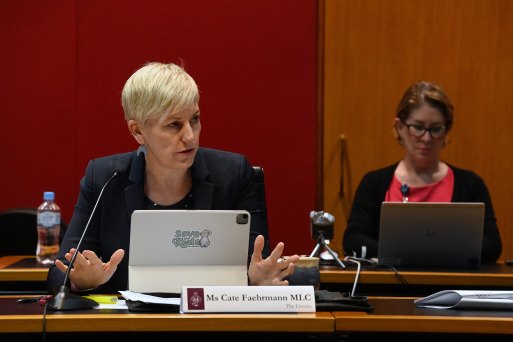The Greens have sworn to make online gambling the next frontier for reform in NSW with calls for a ban on simulated gambling features such as “loot boxes” for under-18s, as participation rates grow faster than any other segment of the gaming and wagering industry.
People who gamble online are twice as likely to have developed serious addictions compared to those who gamble in venues, according to the 2019 NSW Gambling Survey. The Australian online gambling market reached $6.8 billion in 2022 and is forecast to grow by 7 per cent over the next five years.

Cate Faehrmann said parents were particularly concerned about addictive features of online gaming.Credit:Kate Geraghty
A senate inquiry into online gambling has heard that companies are targeting children and young people by embedding gambling-type features such as virtual casinos and “loot boxes”, which offer a mystery prize in return for in-game points or real money, into video games. Adolescents who played “gamblified” games were at greater risk of developing gambling or video-gaming problems, the inquiry found.
The NSW Greens want a national independent gambling commissioner, a pre-commitment scheme on all platforms, a ban on gambling advertisements on television, radio and online, regulation on gambling in video games including a prohibition on loot boxes and a ban on political donations from the gambling industry. The policy was designed in co-ordination with the federal Greens.
NSW Greens gambling spokeswoman Cate Faehrmann said unlike the party’s call for a mandatory cashless gaming system for poker machines, its online gambling platform would not be a condition of its support to a minority government. But it would be the next focus after poker machines.
“Every time I talk about pokies, so many people say to me, ‘But don’t forget about the online gambling, it’s worse’,” Faehrmann said.
“This sleeper issue is creating more harm across a wider section of the community – and potentially lifelong harm. Without proper regulation, we are letting the predatory gambling industry addict an entire generation of young people.”
In 2022, the Australian Communications and Media Authority found that 11 per cent of Australians had participated in online gaming in the previous six months, up from 8 per cent in 2020.
The major sporting codes and Free TV are opposed to tighter rules on sports betting advertising, which they say promotes a legitimate Australian pastime and funds grassroots sport.
Twenty consumer groups in Europe last year called for a ban on deceptive design in loot boxes, extra protections for minors and transactional transparency. The use of virtual currency conceals the actual price of the prizes.
A report by the Norwegian Consumer Council found that the sale and presentation of loot boxes used predatory mechanisms, fostered addiction and targeted vulnerable groups.
The Belgian Gaming Commission recommended in 2018 that criminal charges be raised against gaming companies that continued to offer them, resulting in the removal of those features from games sold in Belgium.
In Australia, the Interactive Games and Entertainment Association has argued that loot boxes should not be regulated under gambling legislation, as it might result in a de facto ban on the feature.
“Loot boxes are a prize mechanic that always provide a reward, while the risk of losing a bet or wager is a central and necessary aspect of gambling,” the association said in its submission to the federal inquiry.
“Most significantly, loot boxes do not provide anything of real-world value, while gambling is always played to enable a person to win money.”
The Morning Edition newsletter is our guide to the day’s most important and interesting stories, analysis and insights. Sign up here.